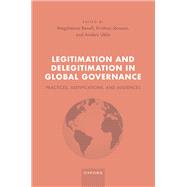
Legitimation and Delegitimation in Global Governance Practices, Justifications, and Audiences
by Bexell, Magdalena; Jönsson, Kristina; Uhlin, AndersBuy New
Rent Textbook
Rent Digital
Used Textbook
We're Sorry
Sold Out
How Marketplace Works:
- This item is offered by an independent seller and not shipped from our warehouse
- Item details like edition and cover design may differ from our description; see seller's comments before ordering.
- Sellers much confirm and ship within two business days; otherwise, the order will be cancelled and refunded.
- Marketplace purchases cannot be returned to eCampus.com. Contact the seller directly for inquiries; if no response within two days, contact customer service.
- Additional shipping costs apply to Marketplace purchases. Review shipping costs at checkout.
Summary
The legitimacy of global governance institutions is both contested and defended in contemporary global politics. Legitimation and Delegitimation in Global Governance explores processes of legitimation and delegitimation of such institutions. How, why, and with what impact on audiences, are global governance institutions legitimated and delegitimated? The book develops a comprehensive theoretical framework for studying processes of (de)legitimation in governance beyond the state. It provides broad comparative analyses to uncover previously unexplored patterns of (de)legitimation processes. A diverse set of global and regional governmental and nongovernmental institutions in different policy fields are included. Variation across these institutions is explained with reference to institutional set-up, policy field characteristics, and broader social structures, as well as to the qualities of agents of (de)legitimation. The approach builds on a mixed-methods research design that uses
quantitative and qualitative new empirical data. Three main interlinked elements of processes of legitimation and delegitimation are at the center of the analysis: the varied practices employed by different agents that may boost or challenge the legitimacy of institutions; the normative justifications that these agents draw on when engaging in legitimation and delegitimation practices; and the different audiences that may be impacted by legitimation and delegitimation. This results in a dynamic interplay between legitimation and delegitimation in contestation over the legitimacy of GGIs.
Author Biography
Magdalena Bexell, Associate Professor in Political Science, Lund University,Kristina Jönsson, Associate Professor in Political Science, Lund University,Anders Uhlin, Professor in Political Science, Lund University
Magdalena Bexell is Associate Professor at the Department of Political Science, Lund University, Sweden. Her main fields of research are international relations, global governance, sustainable development politics, and human rights. Recent research projects concern legitimacy in global governance with a focus on the politics of legitimation and delegitimation. Another strand of her current research explores governance processes at the global-national nexus related to the United Nations 2030 Agenda for sustainable development.
Kristina Jönsson is Associate Professor at the Department of Political Science, Lund University, Sweden. Her research concerns international cooperation in the broad field of development focusing on governance issues, policy processes, and global-local linkages. Current research deal with legitimacy and responsibility in global governance, with a special focus on the United Nations' Sustainable Development Goals and global health. Her previous work concentrated on politics and policy-making in South-East Asia.
Anders Uhlin is Professor at the Department of Political Science, Lund University, Sweden. His research focuses on civil society activism and processes of legitimation and delegitimation in global and regional governance, with a particular focus on Southeast Asia. Another strand of current research concerns the development of civil society elites in Cambodia and Indonesia as well as in Europe. He has previously explored civil society and problems of democratization in Indonesia and the post-Soviet context.
Table of Contents
Part I. Introduction
1. Introduction: The Comparative Study of (De)legitimation Processes in Global Governance, Magdalena Bexell, Kristina Jönsson, and Anders Uhlin
2. The Politics of Legitimation and Delegitimation in Global Governance: A Theoretical Framework, Magdalena Bexell, Karin Bäckstrand, Farsan Ghassim, Catia Gregoratti, Kristina Jönsson, Fredrik Söderbaum, Nora Stappert, and Anders Uhlin
Part II. Practices
3. Practices of (De)legitimation in Global Governance: A Comparative Overview, Anders Uhlin and Soetkin Verhaegen
4. Explaining Variation in Legitimation and Delegitimation Practices: Policy Field and Institutional Access, 1. Explaining Variation in Legitimation and Delegitimation Practices: Policy Field and Institutional Access
5. The Interplay between Delegitimation and Legitimation: Civil Society Protest and the Responses of Global Governance Institutions, Catia Gregoratti and Anders Uhlin
Part III. Justifications
6. The Self-legitimation of Global Governance Institutions: A Comparative Overview of Normative Justifications, Nora Stappert and Catia Gregoratti
7. Justifications in the (De)legitimation of Global Health Governance and Global Trade Governance, Kristina Jönsson and Catia Gregoratti
8. Justifying Delegitimation: African Critiques of Global Governance Institutions, Catia Gregoratti, Nora Stappert, and Fredrik Söderbaum
Part IV. Audiences
9. Audiences of (De)legitimation in Global Governance: A Comparative Overview, Magdalena Bexell, Farsan Ghassim, and Soetkin Verhaegen
10. (De)legitimation and the Composition of Audiences: Comparing Intergovernmental and Nongovernmental Global Governance Institutions, Magdalena Bexell and Karin Bäckstrand
11. The Effects of (De)legitimation on Citizens' Belief about Global Governance: An International Survey Experiment, Farsan Ghassim
Part V. Conclusion
12. Conclusions: Legitimation and Delegitimation of Global Governance Institutions, Kristina Jönsson and Anders Uhlin
An electronic version of this book is available through VitalSource.
This book is viewable on PC, Mac, iPhone, iPad, iPod Touch, and most smartphones.
By purchasing, you will be able to view this book online, as well as download it, for the chosen number of days.
Digital License
You are licensing a digital product for a set duration. Durations are set forth in the product description, with "Lifetime" typically meaning five (5) years of online access and permanent download to a supported device. All licenses are non-transferable.
More details can be found here.
A downloadable version of this book is available through the eCampus Reader or compatible Adobe readers.
Applications are available on iOS, Android, PC, Mac, and Windows Mobile platforms.
Please view the compatibility matrix prior to purchase.
